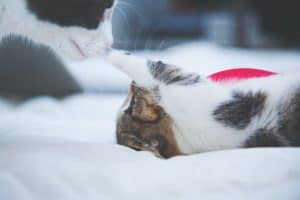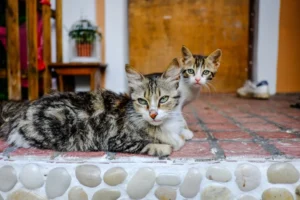Cats are wonderful companions, but sometimes their behaviors can leave us scratching our heads. If you’re wondering, “Why are my cats still nursing?” – we’ve got you covered. Let’s explore the reasons behind this common feline behavior.
Maternal Instincts
Cats’ nursing behavior stems from their maternal instincts deeply ingrained in their DNA. Even after their kittens have grown, mother cats may continue nursing as a way to provide comfort and reassurance. This behavior is a natural instinct that helps strengthen the bond between a cat and her offspring. So, if your cat is still nursing even though her kittens are no longer around, it’s likely just her way of fulfilling her maternal instincts and finding comfort in the familiar routine.
Emotional Comfort
Nursing also serves as a source of emotional comfort for cats of all ages. Cats are known for their need for routine and familiarity, and nursing can be a soothing and calming activity for them. It’s not uncommon for cats to continue nursing well into adulthood as a way to self-soothe and find relaxation in the rhythmic motion. So, if your cat is still engaging in nursing behavior, it could be a sign that she is seeking emotional comfort and security.
- Cats may also nurse as a way to bond with their human family members. By engaging in nursing behavior, cats can establish a sense of closeness and trust with their human companions. If your cat is nursing on you or your belongings, it may be her way of showing affection and seeking comfort in your presence. Just remember, this behavior is a natural part of your cat’s instincts and emotional needs, so try to provide alternative forms of comfort and reassurance if needed.
Lack of Weaning
Did you know that proper weaning practices are crucial for cats? If kittens are weaned too early or not weaned at all, they may continue nursing into adulthood. This behavior is often a result of them not learning to self-soothe or seek comfort in other ways. To help your cats stop nursing, you can gradually introduce solid food to their diet and provide plenty of stimulating toys and activities. Additionally, consulting with a veterinarian for guidance on the weaning process can be beneficial in addressing this issue effectively.
Stress and Anxiety
Cats, like humans, can experience stress and anxiety, which can manifest in various behaviors, including nursing. If your cats are still nursing, it could be a sign that they are feeling overwhelmed or anxious. To address this underlying issue, create a calm and comfortable environment for your feline friends. Providing hiding spots, vertical spaces, and interactive toys can help reduce their stress levels. Consider incorporating regular playtime and gentle interaction to build a bond of trust and security with your cats.
Additional Unique Insight: One often overlooked factor that can contribute to stress and anxiety in cats is changes in their environment. Moving to a new home, introducing new pets, or experiencing loud noises can trigger nursing behavior. Making gradual adjustments and providing a consistent routine can help alleviate their anxiety and reduce the need for nursing as a coping mechanism.
Tips to Help Cats Stop Nursing:
- Provide a Variety of Toys: Engage your cats with different types of toys to keep them mentally stimulated and distracted from nursing.
- Create a Safe Space: Establish a safe and comfortable space where your cats can relax and feel secure.
- Consult a Professional: If your cats continue to nurse despite efforts to address the underlying causes, consider seeking advice from a veterinarian or animal behaviorist.
Remember, understanding the reasons behind your cats’ nursing behavior is the first step in helping them overcome it. By addressing lack of weaning practices and managing stress and anxiety, you can guide your cats towards healthier and happier behaviors.
Health Concerns
If your cats are still nursing, it’s essential to consider potential health concerns that may be contributing to this behavior. One common issue is that the mother cat may be experiencing a false pregnancy, where she continues to produce milk and nurse even though she is not actually pregnant. This can be caused by hormonal imbalances and should be addressed by a veterinarian. Additionally, underlying medical conditions such as mastitis or mammary gland tumors could also be causing your cats to continue nursing. It’s crucial to monitor your cats closely for any signs of discomfort, swelling, or discharge from the nipples, and consult with a vet promptly if you notice any concerning symptoms. Remember, your cats’ health should always be a top priority.
Social Hierarchy
In a multi-cat household, the dynamics of social hierarchy can play a significant role in nursing behavior. Cats establish a hierarchy within their group to determine resources like food, territory, and even access to the mother’s attention. In some cases, subordinate cats may continue nursing from the mother as a way to maintain or improve their position within the group. This behavior can be particularly common if there is a new cat in the household or if there have been recent changes to the social dynamics. If you notice that one cat is consistently nursing from another, it may be a sign of social stress or insecurity. Providing each cat with their own space, resources, and attention can help alleviate tension and reduce the need for nursing behavior. Remember, a harmonious social environment is key to ensuring your cats’ well-being.
Additional Unique Insight or Angle: Keep in mind that while social hierarchy can influence nursing habits in multi-cat households, each cat is an individual with unique needs and personalities. Observing your cats’ interactions and behaviors closely can help you better understand the dynamics at play and address any underlying issues effectively. Being proactive in fostering positive relationships and providing a supportive environment for all your feline companions can go a long way in promoting peace and harmony in your home.
Environment Enrichment
If you’re wondering why your cats are still nursing, it could be due to a lack of enrichment in their environment. Cats, like humans, seek comfort and stimulation. To reduce nursing behavior, try providing alternative outlets for your feline friends. Consider adding interactive toys, scratching posts, cozy blankets, and safe outdoor spaces for exploration. By enriching their environment, you can help distract them from nursing and redirect their focus to more engaging activities.
Behavioral Modification
When it comes to altering feline behavior like nursing, positive reinforcement and environmental changes can be key. Try rewarding your cats with treats or attention when they engage in desired behaviors instead of nursing. Additionally, create a calm and relaxing environment for your cats by providing cozy hiding spots, soothing music, and regular play sessions. By using these techniques, you can help modify your cats’ behavior and discourage nursing habits. Remember, consistency is crucial in behavioral modification, so be patient and persistent in your efforts to change their behavior.
Bonus Tip: Establish a routine for feeding and playtime to help keep your cats mentally and physically stimulated, reducing the likelihood of nursing behavior.
Fun Fact: Did you know?
Have you ever caught your cats nursing on objects or even on you? It may seem strange, but this behavior is actually quite common in felines. Cats sometimes nurse as a way to comfort themselves, much like how humans may suck their thumbs or hug a soft blanket. Understanding this can help you address and manage the behavior effectively.
Cats, especially those who were weaned too early or are experiencing stress, may turn to nursing behaviors for comfort. This can manifest in suckling on blankets, pillows, or even your clothing. Providing alternative comforting items, such as soft toys or blankets, can help redirect their behavior in a more appropriate way. It’s important to observe your cats’ triggers and provide them with a safe and soothing environment to reduce their need for nursing.
Additionally, engaging your cats in interactive play sessions, providing plenty of mental and physical stimulation, and offering affection and attention can help alleviate their stress and reduce the need for nursing behavior. Remember, cats are sensitive creatures who may require extra care and attention to feel secure and content in their environment.
Insightful Tip:
If your cat is constantly nursing on objects or you, try to identify any potential sources of stress in their environment. Cats may resort to nursing behavior as a coping mechanism for anxiety or discomfort. By addressing and alleviating these stressors, you can help your feline friend feel more at ease and reduce their need for nursing.
Alex, a passionate animal lover, has experience in training and understanding animal behavior. As a proud pet parent to two dogs and three cats, he founded AnimalReport.net to share insights from animal experts and expand his knowledge of the animal kingdom.




